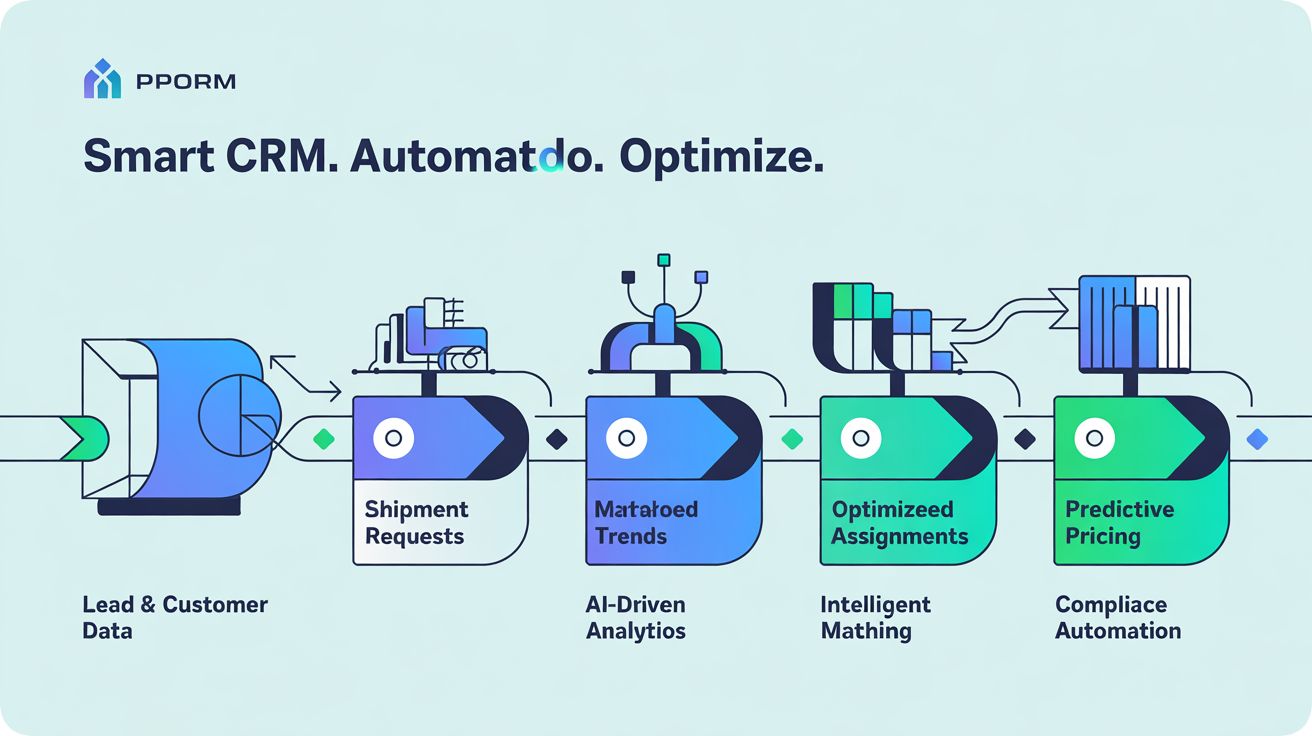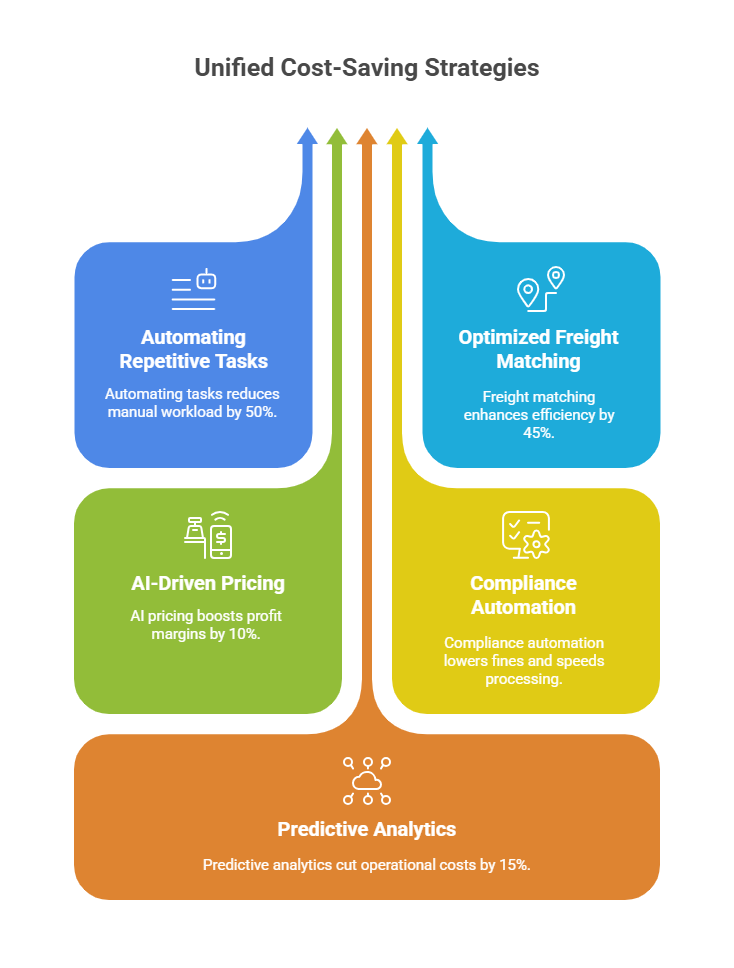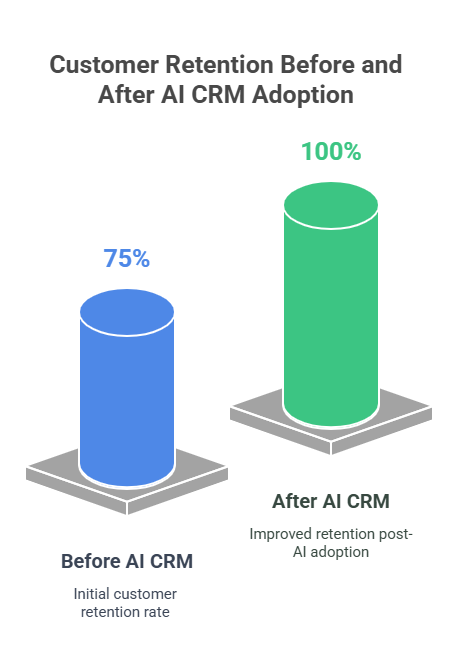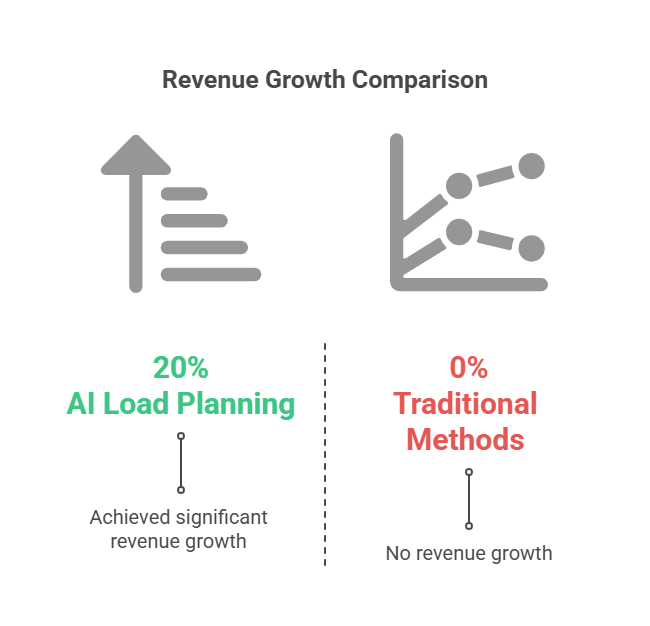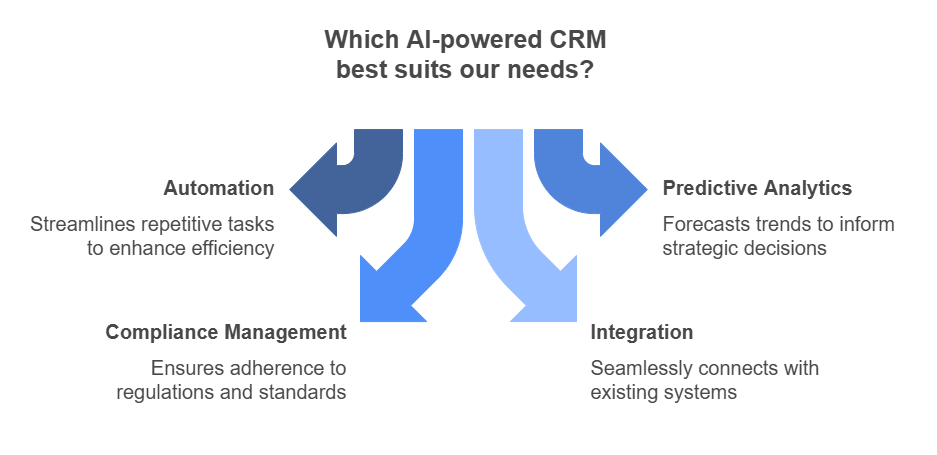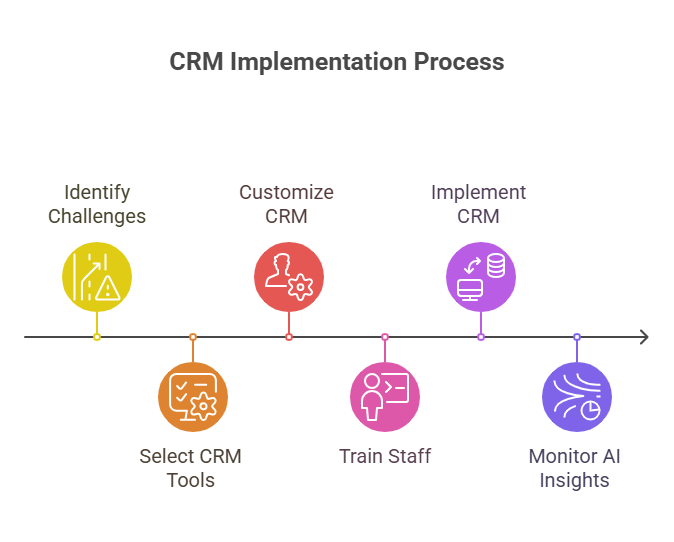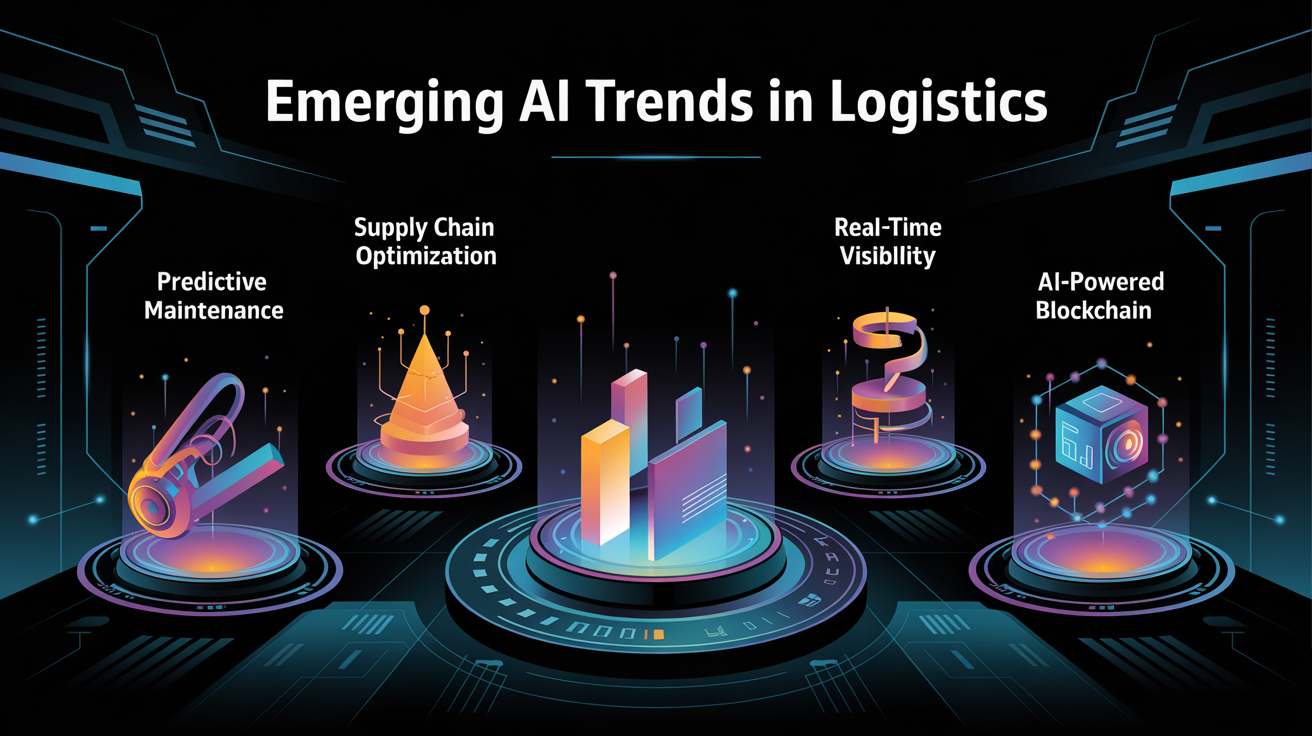Introduction
Freight brokers are the unsung heroes of the logistics industry, connecting shippers and carriers. But they struggle quite a bit to manage their operations effectively. Managing dozens of shipments, meeting different parties’ demands, the daily hustle can be intense. Most brokers end up drowning in paperwork and keeping pace with manual processes that are not just time-consuming but also error-prone.
The logistics sector is under increasing pressure to reduce costs and automate processes in today’s competitive environment. As operational costs continue to rise and customers demand faster and more reliable service, freight brokers have turned to innovative solutions. As a result, the logistics industry is undergoing a digital transformation, and technology is at the heart of optimising operations.
Enter AI-powered CRM (Customer Relationship Management) systems—these are the game-changers that can transform freight brokers into efficiency powerhouses. These cutting-edge weapons utilize AI to automate mundane tasks, refine decision making and boost overall productivity. The key benefit? Shipping solution industries day where traditional systems and rules do not apply; after all, AI-powered CRM can reduce operational costs by 30%, allowing freight brokers to focus on what they do best: connecting shippers with carriers while delivering top-notch service.
Challenges Faced by Freight Brokers in Managing Operations
Logistics serves as a connecter between the movement of goods from Point-A to Point-B between Shippers and Carriers. However they do face many challenges that may affect their operational efficiency and profitability. Now, lets dig into some of the freight broker problems faced in operations management.
High Operational Costs
High operational costs with labor-intensive tasks are one of the major challenges that freight brokers are facing right now. A lot of manpower is often required to manage loads, process invoices, and stay in touch with clients. As stated by Drumkit, cost implications are in labor, created by manual data entry or inefficient workflows undermining profitability. Brokers often allocate 30% of their operating budget to such manual processes, underscoring the critical demand for automation and efficiency gains.
Inefficient Lead and Customer Management
A lot of it deals with poor management of leads and customers. However, many Freight brokers find it laborious to track leads, manage customer interactions, and follow up on new opportunities. This leads to the loss of revenue due to a missed opportunity and less personalized engagement with the client. According to a study released by ATS Inc., a company that provides customer communication and account management solutions, brokers who do not stay in touch with customers will lose accounts to service providers who do.
Poor Freight Matching and Load Management
Load matching is one of the most important bottlenecks in freight brokerage operations. That process can cause delays and inefficiencies, like empty miles and underutilized capacity, that have a direct effect on profitability. According to Research performed by Somerset Logistics, brokers often find it difficult to match available loads with proper carriers, quickly wasting resources and driving costs up.
How AI-powered freight management differs from traditional manual processes explains why automation is the way to go if enterprises want to make significant savings and improve efficiency.” Here’s a quick comparison:
Manual vs. AI-Driven Freight Management
| Aspect | Manual Freight Management | AI-Driven Freight Management |
|---|---|---|
| Load Matching | Time-consuming, prone to errors | Automated, optimized in real-time |
| Operational Costs | High labor costs, inefficiencies | Reduced costs with automation |
| Customer Management | Difficult to track interactions | AI-powered CRM with predictive insights |
| Compliance & Documentation | Prone to human errors and delays | Automated compliance checks and document processing |
| Decision Making | Reactive, based on intuition | Data-driven, real-time analytics for better decisions |
Compliance and Documentation Bottlenecks
Every freight broker has to face complicated regulatory policies that lead to bottlenecks in compliance and documentation. Mistakes in the documentation result not only in fines but also in delays and disputes that could undermine relationships with both clients and carriers. Freight brokerage, however, is no easy task, as the nature of compliance makes it more complicated as brokers must be informed about the regulations.
Lack of Data-Driven Decision Making
Lastly, a lot of freight brokers face challenges due to limited access to data-driven decision-making abilities. Due to a lack of historical data insight, brokers lose critical opportunities for improvement. Now more than ever, real-time insights are needed to improve efficiency and profitability; too many brokers are still using antiquated ways that lack visibility into their operations.
Unutilized data is a lagging factor for various companies to make crucial decisions that could give them discovery.
What Is an AI-Powered CRM for Freight Brokers?
A CRM system powered by AI (Customer Relationship Management) is effectively a sophisticated tool used solely for improving operational efficiency and customer interactions of freight brokers. In contrast to conventional CRMs that largely center on preserving client information and overseeing relationships, AI-powered CRMs utilize AI to streamline processes, offer immediate insights, and enhance decision-making. By integrating this type of AI, freight brokers can completely change how they run their businesses, freeing themselves up to handle more high-level work instead of the nitty-gritty details of running a manual operation.
Key Features of AI-Powered CRM Tailored for Freight Brokerage
Automated Lead Tracking and Customer Engagement
AI Chatbots in CRMs analyze the interaction of customers over many platforms and automate the lead tracking process. This way, no potential business falls through the cracks. For example, if leads are not converted, systems can automatically initiate follow-ups based on the leads’ activity, thereby increasing the likelihood of conversion. As per Elyxr, AI can improve lead generation by examining historical data and discovering high-potential leads.
Intelligent Freight Matching and Load Optimization
Intelligent freight matching is one of the most highlighted features of AI-powered CRMs. These systems can determine the best load assignment by analyzing multiple factors like carrier availability, route efficiency, and shipment requirements. This feature minimizes empty miles and maximizes total capacity utilisation, thus increasing the profitability of freight brokers.
Predictive Analytics for Pricing and Demand Forecasting
Predictive analytics powered by AI assist freight brokers in accurately predicting pricing patterns and demand changes. Such systems help brokers monitor historical data in tandem with current market conditions to set competitive rates, as well as prepare for seasonal fluctuations in demand. The Levity. Ai report notes that it can also ensure the sales pipelines are always well-oiled and adaptable.
Compliance Management and Automated Document Processing
Freight brokers face a mountain of challenges in the industry, especially regulatory requirements. AI-Powered CRM Automate Compliance Management: AI-powered CRMs help streamline compliance management by automatically processing any documents and helping ensure that all paperwork is completed. This minimizes the chances of incurring penalties due to inaccuracies in documentation. Automation can also streamline the process of collecting necessary documents such as bills of lading and contracts, making compliance far more manageable.
How AI-Powered CRM Helps Freight Brokers Save 30% on Operational Costs
AI guided solutions are revolutionizing the freight brokerage process by automizing the topics and by making the operations efficient. Let’s explore how these innovative tools can help freight brokers save up to 30% on operational costs.
Automating Repetitive Tasks
The delivery of one of the most powerful features behind AI-driven CRMs is the automation of repetitive tasks. This encompasses lead nurturing, follow-ups, and email communications, which have historically been a time and resource-consuming task. Brokers reduce the administrative workload and labor costs drastically by automation of such processes. As per Trigent, automation reduces manual tasks by up to 50%, enabling teams to devote the time to more strategic, revenue-generating activities.
Optimized Freight Matching and Load Planning
The AI-enabled load-matching algorithms use data to assist in freight matching and load planning, analyzing everything from the availability of carriers to shipment requirements and route efficiency. This minimizes empty miles and guarantees the efficiency of trucks. For example, Convoy leveraged its automated system to achieve a 45% reduction in empty miles by intelligently bundling shipments. Real-time tracking and smart routing features further complement the broker’s efforts, empowering them to make better decisions and save costs.
Enhanced Customer Relationship Management
Chatbots and virtual assistants powered by AI, embedded in customer relationship management (CRM) systems allow for quick response times and, thus, customer satisfaction. Trained on data until October 2023, this technology enables brokers to personalize their engagement with customers, increasing retention rates and generating repeat business. Research from FreightWaves states that companies that use AI in their customer engagements have seen a 20% increase in customer loyalty on the back of improved quality of service.
AI-Driven Pricing and Negotiation
AI-driven, dynamic pricing strategies help brokers respond to real-time market trends by adjusting rates. This feature can help in better negotiation with carriers and shippers, thereby increasing profitability. According to McKinsey, businesses that leverage AI for pricing optimization can increase profit margins by 10%. Exploiting AI insights can empower brokers in a volatile market while also making sure they’re not leaving money on the table.
Compliance Automation and Paperwork Digitization
Automating compliance management and digitizing paperwork is yet another area in which AI-powered CRMs shine. OCR technology increases the speed of document processing for invoicing and compliance checks, thus saving time spent on manual entry and decreasing the chances of errors. Automated audits also confirm that brokers follow the rules so that they do not face expensive fines for faulty documents. Accessing all compliance information from one place can also reduce costs and time more than compliance can.
Predictive Analytics for Better Decision-Making
Last, the predictive analytics offered by these AI-driven CRM solutions empower freight brokers to make more well-informed decisions. This enables brokers to better plan the movement of freight with demand in the market by using historical data for demand forecasting. With real-time analytics, brokers can control costs and monitor performance more effectively, spotting areas that require improvement at speed. According to AxiomQ, businesses that utilize predictive analytics can minimize operational expenses by nearly 15%, owing to improved resource allocation.
Real-World Case Studies: AI-Powered CRM in Action
AI-Powered CRM Systems in Freight Brokerage: The Exceptional Results Below are three case studies that demonstrate how these technologies are helping transform the logistics landscape.
How a Mid-Sized Freight Brokerage Reduced Operational Costs by 30% with AI-Driven Automation
A mid-market freight brokerage suffering from the challenges of very high operational costs since their processes were very manual decided to implement an AI-powered CRM. The brokerage began automating key functions, including lead tracking, invoicing and load management. They were able to reduce operational costs by 30% in the first year by streamlining these processes.
And, McKinsey writes, businesses that then pursue AI experience similar reductions in costs, largely owing to better efficiency in workflows and fewer mistakes.
Automation allowed their team members to spend more time on strategic activities that strengthened customer relationships and boosted revenues, according to the brokerage. This transformation reduced costs, as well as gave the brokerage the ability to grow sustainably in a highly competitive market.
A before-and-after comparison showcasing key improvements:
| Metric | Before AI-Powered CRM | After AI-Powered CRM |
|---|---|---|
| Operational Costs | High manual labor costs | 30% reduction |
| Lead Tracking | Manual, inconsistent | Automated, real-time |
| Invoicing Process | Prone to errors, slow | AI-driven, error-free |
| Load Management | Inefficient matching | Optimized freight allocation |
| Revenue Growth | Limited by inefficiencies | Increased due to better client focus |
A Large Logistics Company Improving Customer Satisfaction and Retention Through AI-Powered CRM
Here are a few examples of successful implementation of AI in CRM: A leading logistics company integrated an AI-powered CRM into its system to improve customer service. They took advantage of AI chatbots and predictive analytics to deliver real-time updates and personalized responses to that information. As a result of this pivot, customer satisfaction scores jumped.
According to Salesforce, AI-based customer service solutions can tackle as much as 80% of individual inquiries, freeing human agents to handle more difficult problems. Due to such active engagement efforts, the logistics company improved its customer retention rates by 25%
This sheds light on the need for technology to ensure strong relationships with clients and improving the quality of service.
An Independent Freight Broker Leveraging AI for Better Load Planning and Revenue Growth
Currently, we tell the story of an independent freight broker company that used an artificial intelligence-based CRM system to plan and optimize their current loads. Using machine learning algorithms, the broker could identify shipments that fit with available carriers, minimizing empty miles and maximizing the hauling capacity of both the carriers and the broker.
How did this technology reduce the revenue by 20% in 6 months? According to the broker, the AI system did not just optimize load assignments but also generated valuable, actionable insights into market trends and pricing strategies. They were able to use this knowledge to negotiate higher rates with carriers and increase their profitability overall.
Well, these case study examples show the transformational impact of AI-powered CRM systems on freight brokerage operations: Lowers operational cost, improved customer satisfaction, optimized load planning & ultimately increased revenue. The advantages are apparent.
How to Choose the Right AI-Powered CRM for Your Freight Brokerage
Choosing the right AI-powered CRM for freight brokerage is essential for improving operations, making better customer connections, and ultimately boosting profitability. Here’s how to decide if it’s right for you.
Key Features to Look for
Here are the key features you should look for when choosing an AI-powered CRM system for freight brokerage:
AI-Driven Automation for Lead and Customer Management
This is why it helps to scout for a CRM that automates lead tracking, nurturing, and customer engagement. This feature is what protects against letting potential business go awry and gives brokers the ability to keep in touch with clients between meetings.
Smart Freight Matching and Route Optimization
Load-matching algorithms are crucial building blocks of the ecosystem that help reduce empty miles. Using AI, a good CRM system should analyze multiple factors to match shipments to the best-suited carriers.
Predictive Analytics and Dynamic Pricing Tools
A strong CRM should come with built-in predictive analytics features, enabling brokers to anticipate demand and alter pricing tactics according to market trends in real time. It assists in maximizing profitability yet also being competitive.
Compliance Management and Document Automation
Freight brokerage is heavily focused on compliance. All documentation and compliance checks should be automated to minimize errors and ensure that all the regulatory requirements are met as efficiently as possible.
Factors to Consider Before Implementation
Here are some of the most important factors to consider before investing in an AI-powered CRM solution:
Scalability and Customization Based on Business Needs
The CRM you choose should be one that can grow with your business. A good CRM should be tailored to your unique workflows and processes and adapted to accommodate your brokerage as it grows.
Ease of Integration with Existing Logistics Software
Make sure the CRM can integrate well with your existing logistics systems (i.e., TMS or accounting software). This reduces potential disruptions during implementation and improves operational efficiency.
User-Friendly Interface and Mobile Accessibility
You should note that the interface should be user-friendly so that your whole team can operate the system without much training. Mobile accessibility also enables brokers to manage those operations while they are mobile, allowing them to be more responsive.
Cost-Effectiveness and ROI Analysis
Consider the total cost of ownership (TCO), which looks beyond subscription fees and implementation costs to factor in potential ROI. The right CRM will give you a clear picture of how it will save you money or help you make more money over time.
Implementation Strategy: How to Integrate AI-Powered CRM in Your Freight Business
An AI-powered CRM can help freight brokers optimize operations, improve workflows, and, most importantly, improve the bottom line. The following is a step-by-step process on successfully employing this type of technology, as well as tactics for combating common challenges.
Step-by-Step Guide to CRM Implementation
Identify Key Operational Challenges and Business Goals
Start by putting a lens onto your current operations problem. Which areas of your processes are slower than they could be? Do you have a hard time with lead management, client engagement, or compliance? By specifically defining these challenges, you can set specific business goals for your CRM implementation.
Choose an AI-Powered CRM That Fits Your Brokerage Needs
Choose a CRM that suits your mapped needs — it should deliver automated lead tracking, assisted freight matching, and predictive analytics, among other features. Scalability and customization capabilities should be reviewed so your system grows with your business.
Train Employees and Stakeholders on CRM Functionalities
Training is ineluctable for successful implementation. With workshops and training, you can ease employees into the functionalities of the new system. This will facilitate buy-in and give everyone a common understanding of how they can make the most of the CRM.
Integrate CRM with Existing TMS (Transportation Management System)
To optimize workflows, seamless integration with your existing TMS is essential. Make sure your AI-powered CRM can learn from and speak to your TMS for a joint view of operations and visibility.
Monitor Performance and Optimize Based on AI-Driven Insights
Once implemented, continuously monitor the performance of the CRM system. Use AI-based insights to find improvement opportunities and refine processes accordingly. Continually track critical metrics to assess the influence of the CRM on operational efficiency.
Overcoming Common Implementation Challenges
Resistance to Change and How to Ensure Smooth Adoption
The introduction of new technology can be daunting for many employees, as change can be intimidating. To ensure a smooth adoption process, get team members involved in the decision from the beginning. Ensure understanding of the benefits of the new system and continue to support during the change window
Addressing Data Security Concerns with AI-Powered Solutions
It makes a lot of sense as data security is a matter of major concern in adopting any new technology. Choosing an AI-powered CRM for Data protection: Deploy strong security protocols like encryption and access controls to protect sensitive data.
Best Practices for Ensuring CRM Delivers Maximum ROI
Clearly defined success metrics need to be in place before implementation, ensuring maximum return on investment (ROI!). Perform regular evaluations of how well the CRM is meeting your business objectives and make adjustments to your strategies accordingly. Solicit feedback from users to learn what they do or don’t like about it, to learn what’s working and what’s not, and what can be improved to increase effectiveness.
Future of AI in Freight Brokerage and Logistics
Future of AI in Freight Brokerage and Logistics
Artificial intelligence (AI) is set to revolutionize the logistics industry revolutionize the logistics industry. With the growing adoption of AI technologies among freight brokers and logistics enterprises, the industry is set to witness increased operational efficiency, improved customer service, and better management of the complexities of supply chains today. Here’s an examination of how AI is revolutionizing the logistics industry, trends in the industry, and possible future developments.
The Role of AI in Transforming the Logistics Industry
Beyond being a tool for automation, AI is also fundamentally shifting how freight brokers work. With the help of vast data, AI generates smarter decisions and improves logistics management. AI technologies are already being used in a variety of areas, including smart load matching, predictive analytics, dynamic pricing, and automated routing, all of which provide increased efficiencies to brokers and decreased costs for customers, according to RXO.
For example, Convoy and Uber Freight are using AI to find the best matches for freight and offering real-time visibility into shipments. This enables brokers to proactively adjust their strategies to ensure deliveries on time, as these systems can analyze historical data and current conditions to forecast demand fluctuations and identify potential delays. The trained dataset results in the fact that brokers have more accurate estimates, meaning they can lower the impact on customers and improve customer satisfaction.
Emerging Trends in AI-Driven Logistics
A few developing trends showcasing the increasing impact of AI in logistics are as follows:
- AI-Driven Predictive Maintenance: Businesses are starting to implement predictive maintenance with the use of ML algorithms to review machine performance data. By preventing breakdowns and cutting downtime, this approach saves money.
- Supply Chain Optimization: By analyzing data from different sources, AI guarantees real-time optimization of supply chains. This enables companies to recognize inefficiencies, optimize processes, and improve overall supply chain resilience.
- Real-Time Visibility: The AI systems provide the tracking data in real-time, allowing all parties involved in the shipment plasma to monitor the goods from the origin point to the end point. This not only improves efficiency in the operations of inventory management systems but also maintains customers’ trust and satisfaction.
Future Possibilities: AI-Powered Blockchain for Secure and Transparent Freight Transactions
One of the most exciting developments on the horizon is the convergence of AI with blockchain technology. This combination can transform freight transactions into secure and transparent processes. An immutable record of all transactions can be maintained by blockchain, while AI can sift through this data to derive insights on operational efficiencies and fraud detection.
According to the experts, the implementation of AI-supported blockchain solutions can not only eliminate continuous documentation but also streamline compliance management and improve communication between the entities in the supply chain. This homogeneity can also provide faster freight operations while securing sensitive information.
Conclusion: Why Freight Brokers Should Invest in AI-Powered CRM Today
Freight brokerage is being transformed by AI-powered CRMs that provide cost reduction, automation, and data-driven insights. These tools enable brokers to save as much as 30% in operational costs and optimize workflows while ensuring customer satisfaction.
Identify your pain points, find a CRM that addresses your needs, and finally, integrate it with existing systems before you adopt a CRM. The logistics sector is changing at a fast pace, and AI-enabled systems are no longer a choice — they are a must for staying ahead and preparing for the future.
Take the leap and leverage AI-powered CRM. Get in touch with the SigmaSolve Team for a Free Consultation. Learn how our experts in the field of AI in logistics can help you find the best, personalized solutions for your company. Contact us today and take your first step toward transforming your freight brokerage!
FAQs
AI-based CRMs help automate mundane operations, evaluate data to improve functions, etc., thus reducing operational costs by up to 30%. They streamline lead management, optimize interaction with customers, and minimize mistakes, thereby increasing overall profitability for freight brokers. (Source: Forbes, Gartner)
Automation of routine tasks minimizes manual data entry and streamlines load optimization, thus lowering operational costs. They not only help prevent empty miles for brokers but also reduce paperwork and optimize resource allocation, resulting in increased productivity and lower expenses. (Source: Logistics Management, McKinsey & Company)
AI-enabled CRMs do not work the same way a CRM does in the traditional business systems,; the AI portion helps optimize logistic processes and serves to perform data-driven predictive analytics. By providing services like automated freight matching, real-time tracking, and dynamic pricing, they make freight management more efficient and data-driven. (Source: FreightWaves, Harvard Business Review)
Yes, for small and mid-sized freight brokers, the AI-powered CRMs are doing wonders. They drive efficient operations, enable better customer relationships, and you could plug and play processes without large IT investments. However, as it is the age of AI, many solutions are available with scalable and cost-effective plans designed for the growth of business. (Source: Supply Chain Digital, Business Insider)
Yes, AI-based CRMs can do this by leveraging their machine learning capabilities to help match freight based on historical data, availability, and pricing. It helps you optimize load distribution, minimize empty miles, and maximize profitability through the most efficient route and carrier selection. (Source: Transport Topics, MIT Supply Chain Research)
Analytics-derived CRMs assimilate with the IoT technology and GPS, enabling accurate tracking of shipments by brokers in real-time. Through predictive analytics, they identify the optimal routes, minimizing delays and fuel expenses while enhancing overall logistics effectiveness. (Source: FleetOwner, Journal of Transportation Research)
When selecting an AI-powered CRM, look for: Automation, Predictive analytics, Load board integrations, User-friendly Seek scalability, real-time tracking, and reporting capability that suits your business requirements. Customer support and pricing should also play an important role in your decision. (Source: Gartner, FreightWaves)

